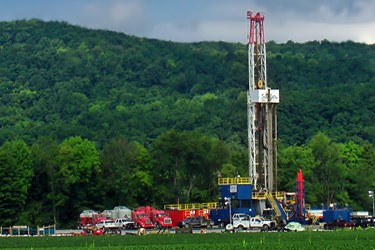Fracking May Be Dangerous To Nearby Residents

By Sara Jerome,
@sarmje

Fracking sites may threaten the health of local residents, according to new research.
"Those who live in close proximity to fracking sites exhibited a greater likelihood to suffer [health] problems than those who lived farther away from natural gas wells, according to a new study of Pennsylvania’s Marcellus shale region," RT reported.
Titled “Proximity to Natural Gas Wells and Reported Health Status: Results of a Household Survey in Washington County, Pennsylvania,” the study was published in Environmental Health Perspectives.
The study concluded: "While these results should be viewed as hypothesis generating, and the population studied was limited to households with a ground fed water supply, proximity of natural gas wells may be associated with the prevalence of health symptoms including dermal and respiratory conditions in residents living near natural gas extraction activities. Further study of these associations, including the role of specific air and water exposures, is warranted."
The study by Yale University researchers "addressed 492 individuals in 180 households in southwestern Pennsylvania, where the Marcellus shale has attracted its fair share of the fracking surge seen throughout the United States," RT reported.
Washington County, where the study was, is a fracking hot spot.
"Of the 624 active natural gas wells located in Pennsylvania’s Washington County, 95 percent were fracked — or injected with millions of gallons of water, sand, and a largely-unknown toxic mix of chemicals in order to extract gas from the shale deposits," the Centre for Global Research reported.
Peter Rabinowitz, one of the reesarchers, said this is “the largest study to date of general health status of people living near natural gas wells,” ThinkProgress reported.
Fracking companies say they take measures to make their practices safe for people and the environment.
"Each well has layers of cement and steel casing to prevent groundwater leaks. Most wells are monitored with state of the art equipment. Emissions from oil and gas activity fall under state and federal limits. Industry is working with the EPA to define New Source Performance Standards (NSPS) that will further reduce emissions," according to Energy From Shale, an industry group.
For more oil and gas news, check out Water Online's Produced Water Solution Center.
